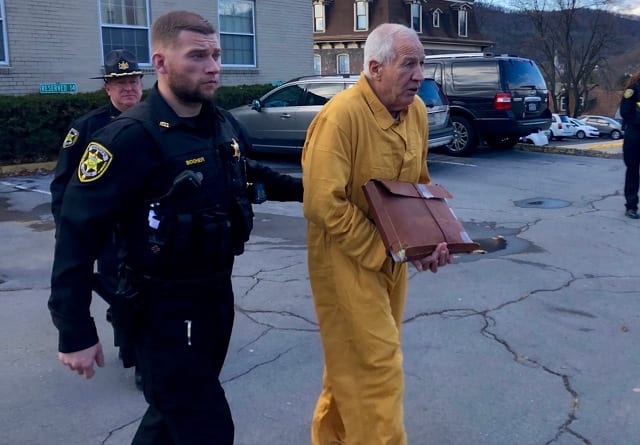Jerry Sandusky is asking a federal court to vacate his decade-old conviction on child sexual abuse charges and order a new trial.
The former Penn State football assistant coach and Second Mile charity founder’s new attorney, Edward J. Rymsza, filed a petition with the U.S. Middle District Court of Pennsylvania on Monday that claims numerous instances of ineffective counsel before and during Sandusky’s June 2012 trial.
Sandusky was convicted on 45 counts related to child sexual abuse and sentenced to 30 to 60 years in state prison. He has maintained his innocence and exhausted most of his appeal options in state court.
The new petition’s claims about ineffective counsel by trial lawyers Joseph Amendola and Karl Rominger mostly compile arguments Sandusky’s appeal attorneys have made during proceedings in recent years. Among them:
• Amendola’s opening statement was prejudicial, Rymsza wrote, because he stated the prosecution had “overwhelming evidence against Mr. Sandusky,” a remark the prosecution used in its closing statement. He also promised Sandusky would testify, but later advised him not to and “that failed vow imploded Mr. Sandusky’s case,” Rymsza wrote.
• Amendola should have objected when the court did not instruct the jury that Sandusky was under no obligation to testify and that “no adverse inference could be drawn from his failure” to do so, according to the petition.
• The reason Amendola advised Sandusky not to testify was that the prosecution would call his son Matt as a rebuttal witness for “virtually anything” he said. Prosecutors, however, asked for that to be stricken from the record because they had already agreed not to call Matt Sandusky as a rebuttal witness.
• The prosecution’s closing argument “was so prejudicial as to violate Mr. Sandusky’s due process
right to a fair trial,” but his attorneys did not object to “numerous inflammatory and prejudicial remarks
that went beyond the bounds of permissible argument,” Rymsza wrote. Those included, according to the petition, “repeated indirect references of Mr. Sandusky’s failure to testify,” “personal attacks on
defense counsel,” and “several inflammatory arguments designed to appeal to the jurors’ emotions.”
• Amendola recommended and arranged for Sandusky to do a national television interview with Bob Costas about the charges, shortly after they were filed in November 2011. Amendola originally planned to do the interview, but Costas’s producers pressed for Sandusky instead. Sandusky, Rymsza wrote, was “entirely unprepared” for the interview, which “was dreadful” and was used by the prosecution throughout the trial.
• Trial counsel did not move for a change of venue, despite “the pervasive media attention in and around Centre County, negative community sentiment regarding the repugnant allegations, and the highly-publicized ancillary consequences of the charges resulting in Joe Paterno’s termination from Penn State,” Rymsza wrote.
• Failure to object resulted in the empanelment of two jurors who were unable to say “they could put aside what they had heard about the case – information that was prejudicial against Mr. Sandusky – and decide the case solely on the evidence received in court,” according to the petition.
• A psychological expert called by the defense was “unhelpful” and opened the door to a rebuttal witness from the prosecution, who testified that Sandusky “suffered from a psychosexual disorder with a focus on adolescence or preadolescence,” Rymsza wrote.
• Sandusky was deprived of effective counsel when the court denied a continuance, according to the petition. His attorneys had five months to sort through more than 10,000 pages of discovery, conduct investigations and prepare witnesses, Rymsza wrote.
• Rymsza added that the court violated Sandusky’s Sixth Amendment rights by forcing him to proceed to trial with “admittedly unprepared, ineffective and ethically conflicted counsel,” who, on the morning of jury selection, asked to be allowed to withdraw from the case. Trial Judge John Cleland denied their requests.
Sandusky is asking for the federal district court to order an evidentiary hearing on his petition, vacate his conviction and sentence and order a new trial.
Attorneys for Sandusky filed a similar petition in federal district court in 2019 on a precautionary basis to protect against the possibility that the statute of limitations had begun to run on his claims while he awaited state appeals to be finalized. A federal magistrate concluded the statute of limitations had not yet begun to run and dismissed it without prejudice, meaning it could be refiled, until state court matters were concluded.
The Pennsylvania Superior Court and Supreme Court both denied Sandusky’s requests for a new trial. In 2019, Superior Court ruled that the trial judge improperly applied mandatory minimums in sentencing Sandusky but later that year a new judge used a different sentencing structure that resulted in the same prison term.
The 78-year-old Sandusky is currently serving his prison sentence at SCI-Laurel Highlands.



